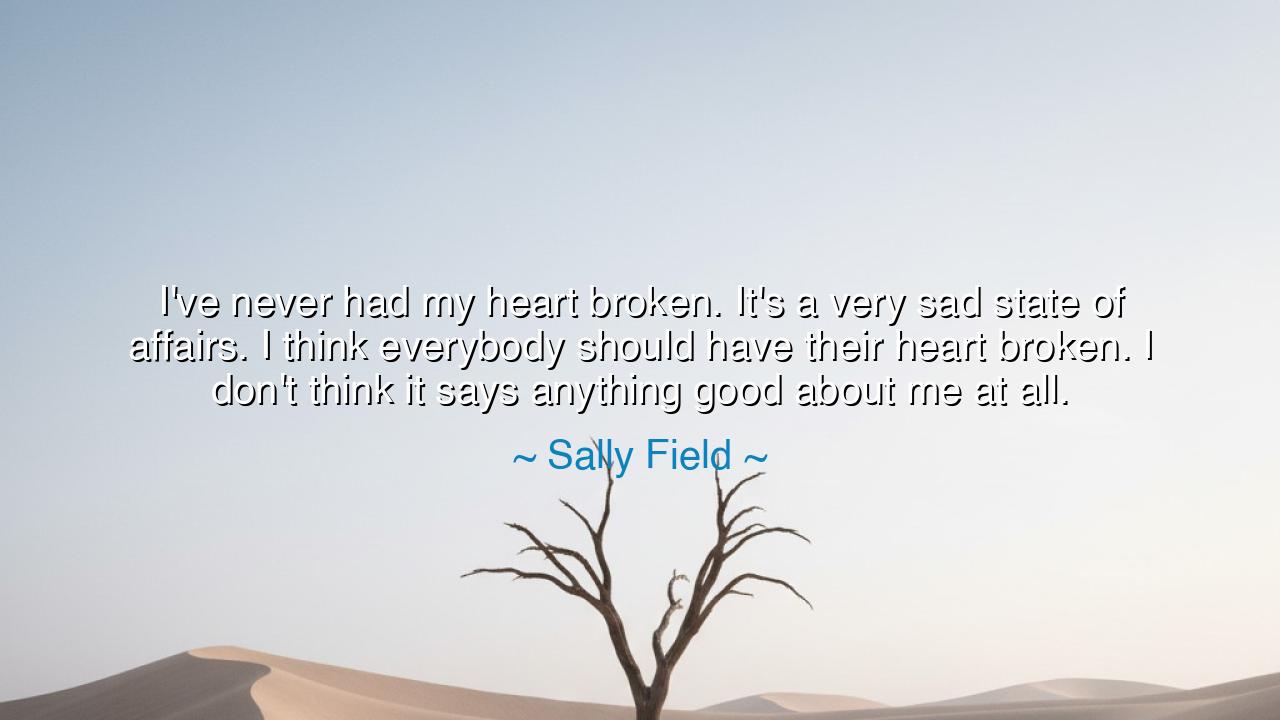
I've never had my heart broken. It's a very sad state of affairs.
I've never had my heart broken. It's a very sad state of affairs. I think everybody should have their heart broken. I don't think it says anything good about me at all.






“I’ve never had my heart broken. It’s a very sad state of affairs. I think everybody should have their heart broken. I don’t think it says anything good about me at all.” — thus spoke Sally Field, and in her confession lies a paradox that is both tender and profound. For she names as a loss not the suffering of heartbreak, but the absence of it. She declares that to live without the breaking of the heart is to have missed a sacred initiation, a trial through which the soul learns depth, compassion, and truth.
The heart, unbroken, may seem like a treasure preserved. But Field reminds us that this unscarred heart may also be untested, untempered, untouched by the fire that forges strength. The sad truth is that pain is a teacher, and to have never endured its lessons is to have lived in a kind of incompleteness. Her words echo the wisdom of the ancients: that suffering, when endured, shapes the character more powerfully than ease.
Consider the life of Rumi, the great Persian poet. His beloved teacher and companion, Shams of Tabriz, was taken from him suddenly, perhaps by betrayal or even death. This wound shattered him—but from this heartbreak flowed verses of such beauty and depth that they still move the world centuries later. Had Rumi never tasted the agony of loss, the world might never have known the ecstasy of his poems. His broken heart became the doorway to greatness.
The origin of Field’s lament lies in the recognition that the human story is not complete without sorrow. To have one’s heart broken is to be thrust into the realm of vulnerability, where illusions are stripped away and truth remains. It is to discover the frailty of love, but also its resilience. Those who have wept from heartbreak often emerge with deeper empathy, for in their wound they learn how tender all human beings truly are.
This wisdom, though difficult, is heroic: it tells us that pain is not shameful but sacred. The sad state is not the wound itself, but the absence of ever having been wounded, for it means the soul has not ventured far enough, risked deeply enough, or loved with abandon. A life without heartbreak may be safe, but it is shallow; a life with heartbreak, though marked by scars, carries the richness of human experience.
The lesson is clear: do not fear the breaking of your heart. Do not shield yourself so fully that you never know loss. To love, to hope, to reach for something greater is always to risk pain—but that risk is the price of depth, the cost of wisdom, the pathway to compassion. Field’s words remind us that heartbreak is not a failure, but an initiation into life’s fullness.
Practical action follows: live and love without holding back. If you are wounded, let your sorrow deepen you rather than harden you. If you have not yet known such loss, do not seek to avoid it forever. Step into love, into risk, into passion, even if it means one day you will weep. And if your heart has been broken, know that it was not in vain—it has expanded your soul’s capacity to feel and to give.
Thus Sally Field’s words endure as a paradox of wisdom: the absence of heartbreak is itself a sad fate. For in the breaking of the heart, we learn the song of humanity, and in our scars we find the strength to love again, deeper and truer than before.






AAdministratorAdministrator
Welcome, honored guests. Please leave a comment, we will respond soon